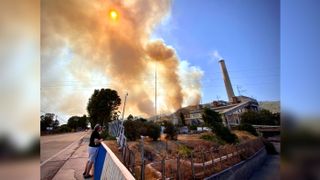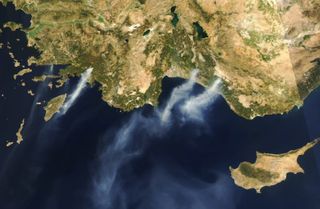Wildfire prompts evacuation at Turkey power plant
Turkey continues to battle dozens of intense wildfires that have now killed eight people and countless animals.

One of the many raging wildfires in Turkey reached a coal-fired power plant on the country's southwestern coast on Wednesday (Aug. 4), prompting evacuations, according to recent news reports.
In the past week, Turkey has been battling intense wildfires, most of them along the Mediterranean Sea and Aegean Sea coasts, according to NASA's Earth Observatory.
Extreme heat, low humidity and strong winds are fueling the fires. Some 167 fires have been brought under control and 16 continue to burn, officials said, as reported by The Associated Press. Eight people and many animals have died; forests have been destroyed; and thousands of people have been evacuated from their homes. Now, one of the wildfires has reached the Kemerkoy power plant in Mugla province.
Related: NASA images show California's largest wildfire from space

People at the power plant and the nearby area of Oren were ordered to leave. As a precaution, hydrogen tanks were emptied and filled with water and all explosive chemicals and hazardous materials were removed, according to local officials and the regional municipality, The Guardian reported. Still, there's a risk that the fire could spread to the coal inside, the regional Mayor Osman Gürün said, according to The Guardian.
Helicopters and planes worked to battle the blaze from above, while firefighters with the help of police water cannons, and rescuers who dug ditches, battled the flames from the ground, according to the AP.
Hot and dry conditions, along with strong winds have made the wildfires in Turkey worse, Turkey's Agriculture and Forestry Minister Bekir Pakdemirli said on Thursday (July 29), according to CNN.
Sign up for the Live Science daily newsletter now
Get the world’s most fascinating discoveries delivered straight to your inbox.
The Mediterranean Basin, where many of the fires are burning, is one of the most susceptible places to climate change risks, Hikmet Ozturk, a forestry expert with the Turkish Foundation for Combating Soil Erosion told CNN. "Typical weather conditions in the summer for the area is hot and dry, which means the risk of fires is already high, and climate change raises that risk."
Experts have been warning for decades that climate change would make weather events such as heat waves more extreme, according to NASA. Turkey and much of southeastern Europe have been facing extreme heat that has not been recorded since the 1980s, according to NASA's Earth Observatory.
Originally published on Live Science.

Yasemin is a staff writer at Live Science, covering health, neuroscience and biology. Her work has appeared in Scientific American, Science and the San Jose Mercury News. She has a bachelor's degree in biomedical engineering from the University of Connecticut and a graduate certificate in science communication from the University of California, Santa Cruz.
Most Popular


